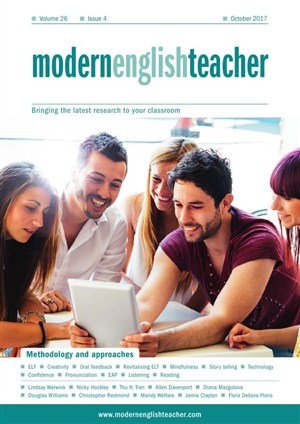Current issue
January 2018 |
 |
Volume 27 |
|
Issue 1 |
Editorial
A note from the editor, Robert McLarty
Pronunciation
Grammar without pron… is like food without taste
Adrian Underhill takes us through some new ways of really putting pronunciation at the core of our teaching.
Putting vowels on the map
Mark Hancock invites us to explore the English vowel system.
ID(2)EAS for teaching pronunciation
Robin Walker comes up with some memorable ways of dealing with pronunciation.
A pronunciation answer key
Jonathan Marks provides answers to ten important pronunciation questions.
EAP learners and pronunciation: dealing with comprehensibility
Craig Thaine looks at an aspect of EAP which is often overlooked.
The child friendly International Phonetic Alphabetk
Jonathan Lee describes how he approaches teaching phonology to young learners.
Using acceptability as a goal for pronunciation teaching
Marty Pilott argues that intelligibility is not always enough when pronunciation is judged in the real world.
Listening
Designing lessons based on video narratives
Jonathon Ryan introduces a new kind of video experience for learners.
An integrated skills approach to speaking and listening
Kat Robb suggests some activities for improving listening and speaking which students will find engaging.
Textmapping
Mark Dawson-Smith describes an essential tool to use when preparing listening assessments.
Speaking
Paper-free and resource-light business communication training
Ben Dobbs considers some minimalist approaches to resources.
Three steps to master the art of storytelling in an ESL lesson
Anna Oğuz describes three different approaches to this well-used activity.
Tips for the speaking part of IELTS
Rory O’Kane offers some advice for the oral test.
Professional development
How meditation can make us better teachers
Ushapa Fortescue gives some insights into an interesting way of avoiding burnout.
Teacher autonomy. How much ‘freedom’ can a school give to the individual teacher?
Edward Alden looks at the constraints which affect a teacher’s autonomy.
The beauty of failure and disappointment
Daniel Xerri discusses a topic many teachers deal with on a daily basis.
Using technology
‘Can I use this music?’: Keeping your videos legal
Christina Rebuffet-Broadus talks us through the administrative aspects of video-making.
English for Academic Purposes
Fostering critical thinking in the language classroom
Thu H. Tran offers his ideas on how to raise awareness of this very important skill.
Integrating language support into a mainstream degree programme
Mark Lawrence describes a way of offering engineering students an engaging language course.
Practical ideas
Duoethnographic projects in the language class
Robert Lowe describes how this research method could be adapted by teachers as a form of project-based learning.
Reviews
Reviews
Roger Gower
A book I’ve used
Pronunciation Pronpack (1–4)
Brian Brennan
Classroom Community Builders
Sandee Thompson
Studying in English: Strategies for success in higher education
Edward de Chazal
Background books
Reflecting on Critical Incidents in Language Education
Wayne Rimmer
Research in Language Teaching and Learning
Rory O'Kane
Summary of books reviewed
What's new
Subscribe to Modern English Teacher from just £30.00.